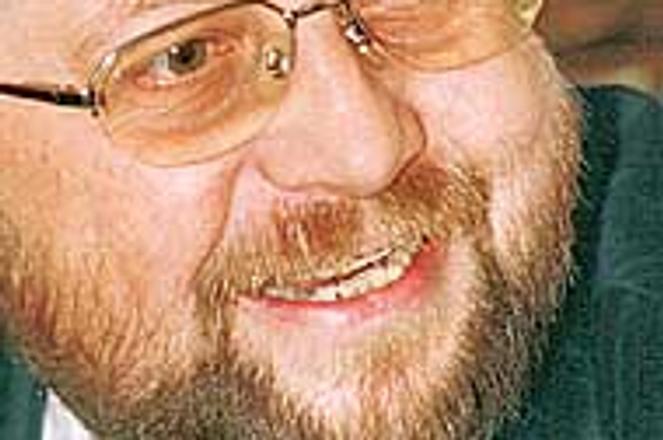HARABIN says he is blameless.photo: File photo
FORMER Supreme Court chief justice Štefan Harabin may face charges if Slovakia's Attorney General's Office confirms allegations over mismanagement of state funds in the top court.
Inspectors with the Slovak Supreme Audit Office (NKÚ) recently presented a report that studies the last two years that Harabin led the court, and said there were several inconsistencies and cases of questionable use of state funds at the court.
Harabin was chief justice for five years until February 2003. He won the seat again in a December 2002 election, but the vote was thrown into doubt by his only competitor in the race, Justice Sergej Kohút, who argued he was not granted equal running conditions in the elections.
The country's constitutional authority, the Constitutional Court, ruled later that the elections had been faulty, and the Supreme Court's deputy chairman, Juraj Majchrák, took over as acting chief justice pending a permanent appointment.
Shortly after Majchrák moved into the top job, he requested an internal audit of the institution, arguing that he wanted an independent body to summarise the financial health of the court.
At a May 14 press conference, the NKÚ's deputy chairwoman, Danica Borisová, stated that the audit had found several cases of "uneconomic management" of state funds at the court over the last two years under Harabin.
The cases include the purchase of an expensive digital videocamera and a car fax machine that the NKÚ found to be superfluous to the purposes of the court.
The report also stated that a "suspicious operation" took place at the court last year, when 30 computers worth nearly Sk1 million (Ř24,000) that were still protected by a warranty were written off the books.
Borisová said that as a budgetary organisation funded by the state, the court was obliged to protect the interests of the state.
"The court was obliged to use all legal means to [repair] the computers under warranty rather than deciding that they could no longer be used," she said.
Harabin said, however, that documents existed at the court proving that the warranty ran out two days before the computers were written off.
But Borisová also noted that the computers had been purchased by the court from an unnamed firm that received the contract because it had promised to give the court a five-year warranty on the machines.
Seven months after the purchase was realised, the court signed an amendment to the contract changing that guarantee to two years.
The auditors have also questioned a bill that the court paid for refreshments for three visitors from Hungary. The bill for Sk26,000 included an item worth Sk11,000 (Ř262), which covered a few bottles of Slovak Tokaj wine.
"The alcohol was more than Sk11,000. We consider such sums unacceptable," Borisová said.
While Borisová said her office was going to forward the findings to the Attorney General's Office, Harabin insisted that the report was a "continuation of a scandalous and politically motivated campaign" against him.
"The NKÚ's report is misleading, untrue, and in conflict with reality in an effort to continue to discredit me," he said.
Since Harabin left office in February, he and Majchrák appeared as rivals in a number of elections for the top post at the Supreme Court. But neither of these two strongest candidates managed to gain a sufficient number of votes to win the position.
Majchrák admitted that the fact that he and Harabin had been rivals for the same post, and that in the past they were known for their frosty relationship, might evoke speculation that he was trying to discredit Harabin. However, he insisted that that was not the case.
"I can assure you that I have no interest in discrediting Mr Harabin, although I know it may seem that way because we both ran for the same post," he said.
Majchrák also said that the only reason he had asked the NKÚ to carry out an audit into the court's management was his desire to be informed from an independent source about the financial shape of the institution he was taking over.
"Mr Harabin's term in office ended February 12 and until that time I had no access to information regarding the management of the court.
"So I asked for the audit so that I knew about the financial situation at the court and so that I later would not be blamed for something that took place before I took on the job," he told The Slovak Spectator on May 19.
The NKÚ audit also confirmed that excessively high bonuses totalling millions of Slovak crowns were paid to some judges at the top court.
The office concluded, however, that despite the questionable distribution of bonuses, in which some judges received tens of thousands of crowns while others nothing at all, the distribution of bonuses was in line with existing laws.
On May 19, Attorney General Milan Hanzel told The Slovak Spectator that his team had not yet received the NKÚ report, but that as soon as it was filed, they would deal with it without delay.
Hanzel also said that the Attorney General's Office would use its own investigators to confirm or reject the NKÚ's findings.
"We are not bound by the NKÚ's conclusions and we will use our own investigators to look into the allegations. I do not care who a particular case relates to; we will do our best to find out the truth," Hanzel said.
Meanwhile, a question mark still hangs over who will be the next Supreme Court chief justice. The next vote on the matter is scheduled for early summer, and neither Harabin or Majchrak are eligible to compete, as they ran in the most recent elections. But if no one is elected then, both judges will be able to run for the post when another vote is held, possibly in September.


